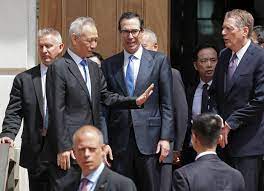
The world must move past ‘spheres of influence’
Ding Gang
Professor Da Wei, a professor at School of Social Sciences, Tsinghua University, recently published a paper called “Security Concerns are Reasonable, Spheres of Influence are Not (The Washington Quarterly Volume 45, 2022 – Issue 2).” The essay provides a Chinese perspective for those willing to understand China’s position on great power diplomacy, particularly the conflict between Russia and Ukraine.

In his article, Da emphasizes that security concerns are not exclusive,which is the most fundamental difference from spheres of influence. While Chinese culture emphasizes the lawfulness of an action or policy, it also often emphasizes the need to be sensible and reasonable. Being sensible, reasonable, and lawful constitutes three levels of consideration that Chinese culture often uses when judging an action or policy. Lawfulness is the most important consideration in the political sphere, whilst being sensible and reasonable is also criteria that strategists and decision-makers need to consider.
If one reads this article carefully, he or she should be able to see that the Chinese have their own basic positions and principles on international affairs, especially on what kind of diplomatic strategy a large country like China should have, and that the process of forming them is related to China’s history, tradition, and culture. Therefore, this has some differences with the West.
When I discussed Professor Da’s view with Chinese and foreign scholars, some of them thought that it would be better to replace “reasonable” with “legitimate.” I asked Da, and he said that he used “reasonable” mainly because it is backed by reason, and that “legitimate” has to do with rules, laws, and natural rights, as can be seen from the root of the word. “I don’t think security concerns have anything to do with those. There is often a bit of ‘reason’ behind a country’s security concerns, and this is where reason can be applied,” Da said.

If you see China’s foreign policy through the binoculars of the basic Western concept of diplomacy, for instance, the logic of sphere of influence, you will of course misjudge it, and even develop extreme perceptions of China as an enemy.
Some Westerners who are now playing up the “China threat theory” are by and large following this logic in looking at China, particularly when observing China’s attitude toward Russia-Ukraine conflict. The danger is that when this logic is extended to the policy arena, they are intentionally creating China as their own enemy.
The Chinese have an aversion to spheres of influence, as do many once colonized countries in Asia, who have come out of imperial spheres of influence and are therefore very wary of falling into the trap again.
Being part of a sphere of influence not only means that they have to follow the leadership of the big power, but also that they have to follow the rules and fight for that specific sphere of influence, which leads to a world of bloc warfare, where this street is yours and that is another bloc’s. Unfortunately, the West tends not to understand the miserable experiences of these former colonies.
Once you join NATO, you have NATO to protect your security, but NATO is a military bloc, and as a result, you run the risk of becoming the enemy of the opposite side of the sphere of influence. And how your opponents see you, of course, will also look through the lens of a sphere of influence.
One of the results of the Russia-Ukraine conflict was to redraw a deep divide across spheres of influence, and now we are seeing a rapid development in Russia’s relations with Iran, North Korea and others. We might even wonder if there will be the emergence of another new military bloc to rival NATO.
The US is following the same path with China containment, and when Washington identifies China as a competitor, the key is that it sees this competitor in terms of the fight for spheres of influence.
Competition does not necessarily lead to war, but if competition is seen as a struggle for spheres of influence, to fight China through alliances, to come up with some five-eyed alliance, CHIP4, AUKUS… the result is toward bloc antagonism, and eventually China will be identified as the enemy.
It is probably time for the West to try to walk away a little bit from the old security logic of “sphere of influence” and think more about the concept of security concerns.
The writer is a senior editor with People’s Daily, and currently a senior fellow with the Chongyang Institute for Financial Studies at Renmin University of China
